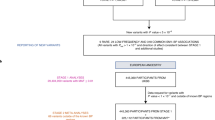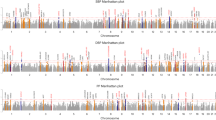Abstract
The effects of alleles in many genes are believed to contribute to common complex diseases such as hypertension. Whether risk alleles comprise a small number of common variants or many rare independent mutations at trait loci is largely unknown. We screened members of the Framingham Heart Study (FHS) for variation in three genes—SLC12A3 (NCCT), SLC12A1 (NKCC2) and KCNJ1 (ROMK)—causing rare recessive diseases featuring large reductions in blood pressure. Using comparative genomics, genetics and biochemistry, we identified subjects with mutations proven or inferred to be functional. These mutations, all heterozygous and rare, produce clinically significant blood pressure reduction and protect from development of hypertension. Our findings implicate many rare alleles that alter renal salt handling in blood pressure variation in the general population, and identify alleles with health benefit that are nonetheless under purifying selection. These findings have implications for the genetic architecture of hypertension and other common complex traits.
This is a preview of subscription content, access via your institution
Access options
Subscribe to this journal
Receive 12 print issues and online access
$209.00 per year
only $17.42 per issue
Buy this article
- Purchase on SpringerLink
- Instant access to full article PDF
Prices may be subject to local taxes which are calculated during checkout




Similar content being viewed by others
Accession codes
Accessions
GenBank/EMBL/DDBJ
Change history
13 April 2008
In the version of this article initially published online, an equal contribution statement was missing for the first two authors Weizhen Ji and Jia Nee Foo. These authors should be identified as equal contributors to the manuscript. The error has been corrected for all versions of the article
References
Levy, D. et al. Evidence for a gene influencing blood pressure on chromosome 17. Genome scan linkage results for longitudinal blood pressure phenotypes in subjects from the Framingham heart study. Hypertension 36, 477–483 (2000).
Saxena, R. et al. Genome-wide association analysis identifies loci for type 2 diabetes and triglyceride levels. Science 316, 1331–1336 (2007).
Scott, L.J. et al. A genome-wide association study of type 2 diabetes in Finns detects multiple susceptibility variants. Science 316, 1341–1345 (2007).
Zeggini, E. et al. Replication of genome-wide association signals in UK samples reveals risk loci for type 2 diabetes. Science 316, 1336–1341 (2007).
Helgadottir, A. et al. A common variant on chromosome 9p21 affects the risk of myocardial infarction. Science 316, 1491–1493 (2007).
McPherson, R. et al. A common allele on chromosome 9 associated with coronary heart disease. Science 316, 1488–1491 (2007).
Frayling, T.M. et al. A common variant in the FTO gene is associated with body mass index and predisposes to childhood and adult obesity. Science 316, 889–894 (2007).
The Wellcome Trust Case Control Consortium. Genome-wide association study of 14,000 cases of seven common diseases and 3,000 shared controls. Nature 447, 661–678 (2007).
Pritchard, J.K. Are rare variants responsible for susceptibility to complex diseases? Am. J. Hum. Genet. 69, 124–137 (2001).
Lifton, R.P., Gharavi, A.G. & Geller, D.S. Molecular mechanisms of human hypertension. Cell 104, 545–556 (2001).
Lifton, R.P. Genetic dissection of human blood pressure variation: common pathways from rare phenotypes. Harvey Lect. 100, 71–101 (2004–2005).
Birkenhäger, R. et al. Mutation of BSND causes Bartter syndrome with sensorineural deafness and kidney failure. Nat. Genet. 29, 310–314 (2001).
Simon, D.B. et al. Mutations in the chloride channel gene, CLCNKB, cause Bartter's syndrome type III. Nat. Genet. 17, 171–178 (1997).
Simon, D.B. et al. Bartter's syndrome, hypokalaemic alkalosis with hypercalciuria, is caused by mutations in the Na-K-2Cl cotransporter NKCC2. Nat. Genet. 13, 183–188 (1996).
Simon, D.B. et al. Genetic heterogeneity of Bartter's syndrome revealed by mutations in the K+ channel, ROMK. Nat. Genet. 14, 152–156 (1996).
Simon, D.B. et al. Gitelman's variant of Bartter's syndrome, inherited hypokalaemic alkalosis, is caused by mutations in the thiazide-sensitive Na-Cl cotransporter. Nat. Genet. 12, 24–30 (1996).
Rudin, A. Bartter's syndrome. A review of 28 patients followed for 10 years. Acta Med. Scand. 224, 165–171 (1988).
Chanchevalap, S. et al. Involvement of histidine residues in proton sensing of ROMK1 channel. J. Biol. Chem. 275, 7811–7817 (2000).
Riveira-Munoz, E. et al. Transcriptional and functional analyses of SLC12A3 mutations: new clues for the pathogenesis of Gitelman syndrome. J. Am. Soc. Nephrol. 18, 1271–1283 (2007).
De Jong, J.C. et al. Functional expression of mutations in the human NaCl cotransporter: evidence for impaired routing mechanisms in Gitelman's syndrome. J. Am. Soc. Nephrol. 13, 1442–1448 (2002).
Schwalbe, R.A., Bianchi, L., Accili, E.A. & Brown, A.M. Functional consequences of ROMK mutants linked to antenatal Bartter's syndrome and implications for treatment. Hum. Mol. Genet. 7, 975–980 (1998).
Sabath, E. et al. Pathophysiology of functional mutations of the thiazide-sensitive Na-Cl cotransporter in Gitelman disease. Am. J. Physiol. Renal Physiol. 287, F195–F203 (2004).
Syrén, M.-L. et al. Identification of fifteen novel mutations in the SLC12A3 gene encoding the Na-Cl co-transporter in Italian patients with Gitelman syndrome. Hum. Mutat. 20, 78 (2002).
Lemmink, H.H. et al. Novel mutations in the thiazide-sensitive NaCl cotransporter gene in patients with Gitelman syndrome with predominant localization to the C-terminal domain. Kidney Int. 54, 720–730 (1998).
Ramensky, V., Bork, P. & Sunyaev, S. Human non-synonymous SNPs: server and survey. Nucleic Acids Res. 30, 3894–3900 (2002).
Ng, P.C. & Henikoff, S. SIFT: Predicting amino acid changes that affect protein function. Nucleic Acids Res. 31, 3812–3814 (2003).
Thomas, P.D. et al. Applications for protein sequence–function evolution data: mRNA/protein expression analysis and coding SNP scoring tools. Nucleic Acids Res. 34, W645–W650 (2006).
Van Gestel, S., Houwing-Duistermaat, J.J., Adolfsson, R., van Duijn, C.M. & Van Broeckhoven, C. Power of selective genotyping in genetic association analyses of quantitative traits. Behav. Genet. 30, 141–146 (2000).
Cruz, D.N. et al. Mutations in the Na-Cl cotransporter reduce blood pressure in humans. Hypertension 37, 1458–1464 (2001).
Cooper, D.N., Krawczak, M. & Antonorakis, S.E. The nature and mechanisms of human gene mutation. In The Metabolic and Molecular Bases of Inherited Disease (eds. Scriver, C., Beaudet, A.L., Sly, W.S. & Valle, D.) 259–291 (McGraw-Hill, New York, 1995).
The ALLHAT Officers and Coordinators for the ALLHAT Collaborative Research Group. Major outcomes in high-risk hypertensive patients randomized to angiotensin-converting enzyme inhibitor or calcium channel blocker vs diuretic: the Antihypertensive and Lipid-Lowering Treatment to Prevent Heart Attack Trial (ALLHAT). J. Am. Med. Assoc. 288, 2981–2997 (2002).
Kannel, W.B., Wolf, P.A., Verter, J. & McNamara, P.M. Epidemiologic assessment of the role of blood pressure in stroke. The Framingham Study. J. Am. Med. Assoc. 214, 301–310 (1970).
He, J. & Whelton, P.K. Elevated systolic blood pressure and risk of cardiovascular and renal disease: overview of evidence from observational epidemiologic studies and randomized controlled trials. Am. Heart J. 138, 211–219 (1999).
Kannel, W.B., Schwartz, M.J. & McNamara, P.M. Blood pressure and risk of coronary heart disease: the Framingham study. Dis. Chest 56, 43–52 (1969).
Franklin, S.S. et al. Does the relation of blood pressure to coronary heart disease risk change with aging? The Framingham Heart Study. Circulation 103, 1245–1249 (2001).
Sieck, U.V. & Ohlsson, A. Fetal polyuria and hydramnios associated with Bartter's syndrome. Obstet. Gynecol. 63, 22S–24S (1984).
Ohlsson, A., Sieck, U., Cumming, W., Akhtar, M. & Serenius, F. A variant of Bartter's syndrome. Bartter's syndrome associated with hydramnios, prematurity, hypercalciuria and nephrocalcinosis. Acta Paediatr. Scand. 73, 868–874 (1984).
Shaer, A.J. Inherited primary renal tubular hypokalemic alkalosis: a review of Gitelman and Bartter syndromes. Am. J. Med. Sci. 322, 316–332 (2001).
Cohen, J.C. et al. Multiple rare alleles contribute to low plasma levels of HDL cholesterol. Science 305, 869–872 (2004).
Romeo, S. et al. Population-based resequencing of ANGPTL4 uncovers variations that reduce triglycerides and increase HDL. Nat. Genet. 39, 513–516 (2007).
Veterans Administration Cooperative Study Group on Antihypertensive Agents. Effects of treatment on morbidity in hypertension. Results in patients with diastolic blood pressures averaging 115 through 129 mm Hg. J. Am. Med. Assoc. 202, 1028–1034 (1967).
Tchernitchko, D., Goossens, M. & Wajcman, H. In silico prediction of the deleterious effect of a mutation: proceed with caution in clinical genetics. Clin. Chem. 50, 1974–1978 (2004).
Takahashi, N. et al. Posttranscriptional compensation for heterozygous disruption of the kidney-specific NaK2Cl cotransporter gene. J. Am. Soc. Nephrol. 13, 604–610 (2002).
Murphy, K.M. & Berg, K.D. Mutation and single nucleotide polymorphism detection using temperature gradient capillary electrophoresis. Expert Rev. Mol. Diagn. 3, 811–818 (2003).
Franklin, S.S. et al. Hemodynamic patterns of age-related changes in blood pressure. The Framingham Heart Study. Circulation 96, 308–315 (1997).
Cruz, D.N. The renal tubular Na-Cl co-transporter (NCCT): a potential genetic link between blood pressure and bone density? Nephrol. Dial. Transplant. 16, 691–694 (2001).
Acknowledgements
We thank C. Nelson-Williams for management of the DNA database. J.N.F. is supported by the Agency for Science, Technology and Research, Singapore. This work was supported in part by a US National Institutes of Health Specialized Center of Research in Hypertension grant (to R.P.L.) and the US National Heart, Lung and Blood Institute's Framingham Heart Study contract NO1-HC-25195.
Author information
Authors and Affiliations
Corresponding author
Supplementary information
Supplementary Text and Figures
Supplementary Figures 1–2, Supplementary Tables 1–5, Supplementary Note (PDF 128 kb)
Rights and permissions
About this article
Cite this article
Ji, W., Foo, J., O'Roak, B. et al. Rare independent mutations in renal salt handling genes contribute to blood pressure variation. Nat Genet 40, 592–599 (2008). https://doi.org/10.1038/ng.118
Received:
Accepted:
Published:
Issue Date:
DOI: https://doi.org/10.1038/ng.118



